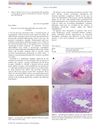 8 citations,
July 2018 in “European Journal of Dermatology”
8 citations,
July 2018 in “European Journal of Dermatology” A medication may help with hair growth in psoriasis, and a skin condition might be linked to a specific bacteria.
[object Object]  8 citations,
February 2012 in “International Journal of Dermatology”
8 citations,
February 2012 in “International Journal of Dermatology” Runners often face skin problems like blisters and infections, and both prevention and early treatment are important.
 8 citations,
September 2011 in “European Journal of Dermatology”
8 citations,
September 2011 in “European Journal of Dermatology” Most treatments for Frontal Fibrosing Alopecia are ineffective, but early anti-inflammatory therapy may help and the condition may stabilize over time.
 8 citations,
December 2009 in “Journal of The European Academy of Dermatology and Venereology”
8 citations,
December 2009 in “Journal of The European Academy of Dermatology and Venereology” Researchers found a new mutation in the FERMT1 gene in a Spanish family with Kindler syndrome.
 8 citations,
January 2007 in “Mycoses”
8 citations,
January 2007 in “Mycoses” A man's scalp infection, mistaken for bacterial, was actually a rare fungal infection treated successfully with antifungal medication.
 8 citations,
November 1990 in “Archives of Dermatology”
8 citations,
November 1990 in “Archives of Dermatology” A woman with EMS showed unusual skin mucinosis without the typical hard skin syndrome, suggesting EMS can cause skin mucinosis.
 7 citations,
June 2021 in “JAAD Case Reports”
7 citations,
June 2021 in “JAAD Case Reports” A woman had hair loss, nail changes, and skin peeling after a COVID-19 infection, which got better on their own.
 7 citations,
March 2019 in “Journal of The European Academy of Dermatology and Venereology”
7 citations,
March 2019 in “Journal of The European Academy of Dermatology and Venereology” A man developed a skin reaction from metronidazole, which improved after stopping the drug and starting steroids.
 7 citations,
October 2017 in “Urologic Oncology: Seminars and Original Investigations”
7 citations,
October 2017 in “Urologic Oncology: Seminars and Original Investigations” Men with male pattern baldness have a higher risk of aggressive prostate cancer and benign prostatic hyperplasia.
 7 citations,
January 2015 in “Current problems in dermatology”
7 citations,
January 2015 in “Current problems in dermatology” Hair loss can be caused by stress, infections, drugs, and various diseases, with treatment depending on accurate diagnosis.
 7 citations,
July 1999 in “In Practice”
7 citations,
July 1999 in “In Practice” The conclusion is that a systematic approach is key for treating symmetrical alopecia in dogs, but treatment may not always be necessary.
 6 citations,
January 2017 in “British Journal of Dermatology”
6 citations,
January 2017 in “British Journal of Dermatology” Frontal fibrosing alopecia is a scarring hair loss condition mainly affecting older women, with no known cause and treatments that may help stabilize hair loss.
 6 citations,
March 2009 in “Journal of the European Academy of Dermatology and Venereology”
6 citations,
March 2009 in “Journal of the European Academy of Dermatology and Venereology” Mexican patients had a lower incidence of skin reactions to drugs and no significant link between these reactions and the TNF2 gene variant.
 6 citations,
February 1974 in “The BMJ”
6 citations,
February 1974 in “The BMJ” The document concludes that scalp disorders can be treated with hair washing, specific shampoos, medications, and sometimes surgery or hair transplants, but hereditary baldness is untreatable.
 5 citations,
April 2019 in “Journal of The American Academy of Dermatology”
5 citations,
April 2019 in “Journal of The American Academy of Dermatology” Frontal Fibrosing Alopecia may be a complex condition linked to hormonal changes in women, not just a form of Lichen Planopilaris.
 5 citations,
January 2017 in “Clinics in Dermatology”
5 citations,
January 2017 in “Clinics in Dermatology” Skin symptoms without a medical cause often reflect psychological stress and are influenced by culture, requiring a team approach for treatment.
 5 citations,
October 2016 in “Anais Brasileiros de Dermatologia”
5 citations,
October 2016 in “Anais Brasileiros de Dermatologia” A man from Brazil had a rare case of leprosy on his scalp, which improved with treatment.
 5 citations,
January 2016 in “Journal of The American Academy of Dermatology”
5 citations,
January 2016 in “Journal of The American Academy of Dermatology” Skin doctors should know about skin and kidney disease links to prevent serious kidney problems.
 5 citations,
August 2014 in “Australasian journal of dermatology”
5 citations,
August 2014 in “Australasian journal of dermatology” Sorafenib can cause delayed skin problems, so patients need careful monitoring.
 5 citations,
July 2013 in “Our Dermatology Online”
5 citations,
July 2013 in “Our Dermatology Online” Lichen planopilaris is the most common type of scarring hair loss observed, with a variety of symptoms and tissue changes.
 5 citations,
March 2011 in “Journal of pediatric health care”
5 citations,
March 2011 in “Journal of pediatric health care” The girl with autoimmune hair loss might regrow hair within a year, and treatments can help but not prevent recurrence; dermatologist referral and corticosteroids are recommended.
 5 citations,
March 2005 in “Journal of The American Academy of Dermatology”
5 citations,
March 2005 in “Journal of The American Academy of Dermatology”  5 citations,
January 1998 in “Clinical and experimental dermatology”
5 citations,
January 1998 in “Clinical and experimental dermatology” Myotonic dystrophy should be considered in patients with hair thinning, and genetic counseling is important.
[object Object]  5 citations,
November 1992 in “Current problems in dermatology”
5 citations,
November 1992 in “Current problems in dermatology” Glucocorticoids are powerful anti-inflammatory drugs that must be used carefully to avoid serious side effects.
 5 citations,
July 1988 in “British journal of dermatology/British journal of dermatology, Supplement”
5 citations,
July 1988 in “British journal of dermatology/British journal of dermatology, Supplement” Diphencyprone therapy can effectively treat severe hair loss in motivated patients.
 5 citations,
January 1987 in “Gynecologic and obstetric investigation”
5 citations,
January 1987 in “Gynecologic and obstetric investigation” Cyproterone acetate implants were more effective at reducing facial hair and improving skin in severe hirsutism than oral treatment.

research Acne
4 citations,
January 2019 Acne is a common skin condition that can be influenced by diet, lifestyle, and hormones, and requires a treatment approach that includes psychological considerations.
 4 citations,
November 2018 in “JAAD case reports”
4 citations,
November 2018 in “JAAD case reports” Alopecia areata can sometimes appear as a straight line of hair loss instead of round patches.
 4 citations,
October 2018 in “Experimental Dermatology”
4 citations,
October 2018 in “Experimental Dermatology” Dermoscopy shows that diffuse alopecia areata progresses through specific hair growth stages.
 4 citations,
March 2017 in “Journal of evolution of medical and dental sciences”
4 citations,
March 2017 in “Journal of evolution of medical and dental sciences” Older adults often have dry skin and itching, with high blood pressure frequently linked to skin problems.






























